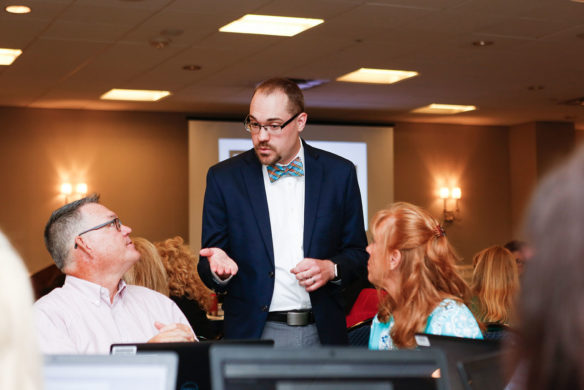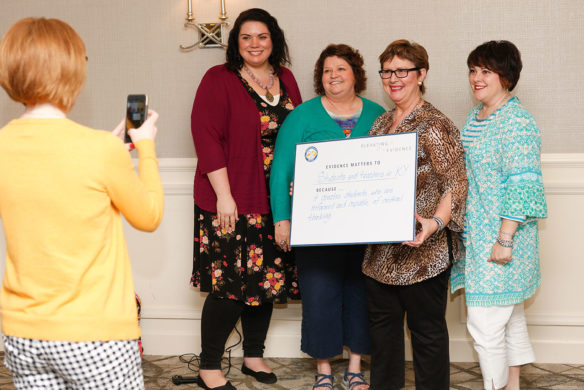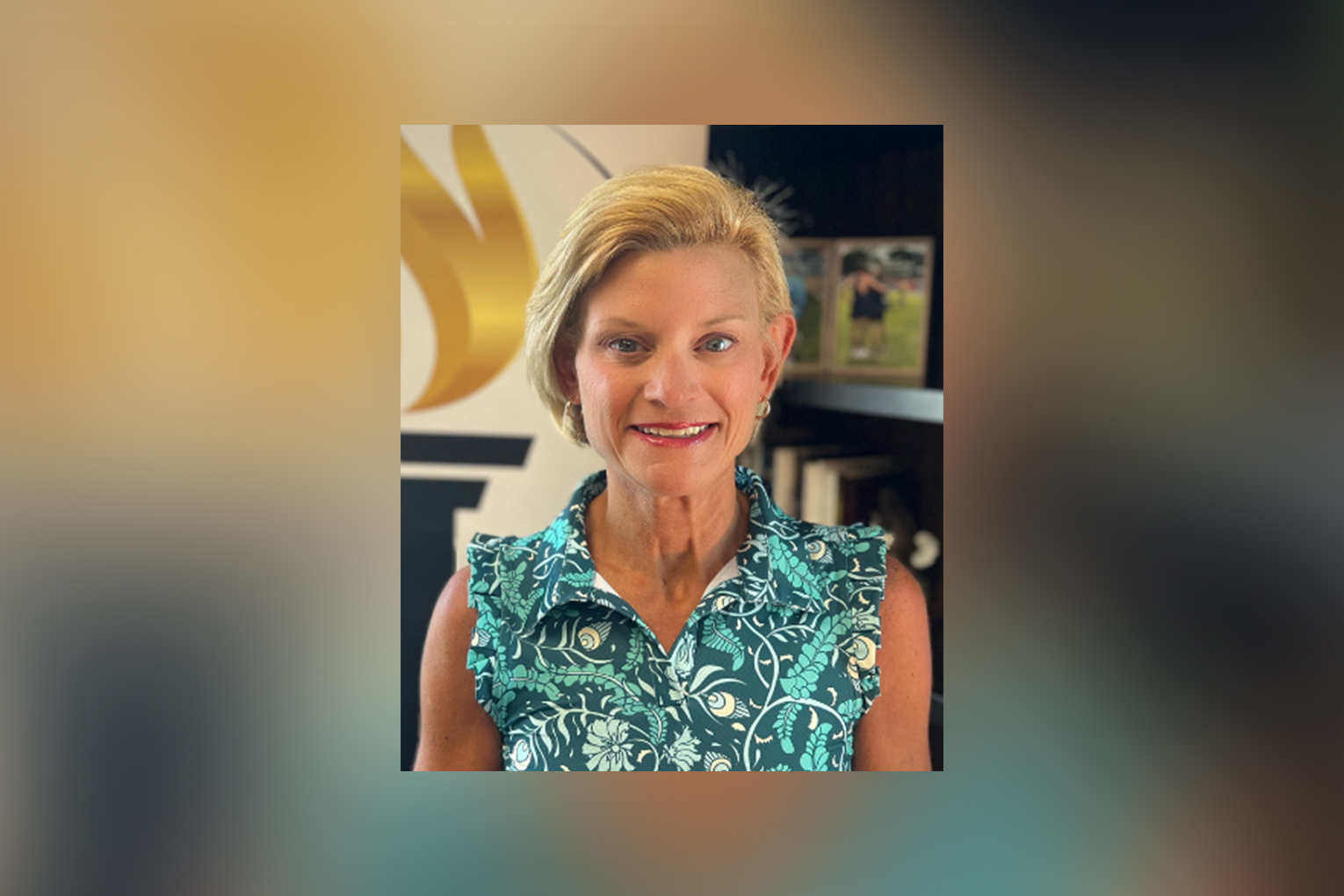
Matthew Courtney, center, an educational recovery consultant in the Kentucky Department of Education’s Division of Consolidated Plans and Audits, talks with Curtis Higgins, left, and Leesa Moman, two of KDE’s educational recovery specialists, during a workshop on supporting the evidence-based requirements in the Every Student Succeeds Act. The Kentucky Department of Education will conduct the workshop five times in July for principals and teacher leaders.
Photo by Mike Marsee, April 30, 2019
- A series of workshops to be held in July is designed to introduce school and district leaders to the evidence-based provisions in ESSA.
- The workshops are part of a larger initiative in which KDE is working to support schools in identifying and implementing evidence-based practices.
By Mike Marsee
mike.marsee@education.ky.gov
It’s time to take a closer look at the why.
“It’s really just what good educators do,” said Matthew Courtney, an educational program consultant in the Kentucky Department of Education’s (KDE) Division of School and Program Improvement. “Good educators know what works and great educators know why it works.”
The Every Student Succeeds Act (ESSA), passed by Congress in 2015, calls for school improvement efforts be rooted in “evidence-based activities, strategies, or interventions,” and KDE is working to support schools in identifying and implementing evidence-based practices.
KDE will hold a series of workshops in July designed to introduce school and district leaders to the evidence-based provisions in ESSA and to facilitate conversations about common issues in educational research.
 KDE’s Office of Continuous Improvement and Support is branding the workshops and all of its efforts to support schools in meeting ESSA’s evidence-based requirements as Elevating Evidence. At about the same time the workshops are being held, KDE will introduce a number of related resources on its evidence-based practices webpage and will launch a social media campaign about why evidence matters.
KDE’s Office of Continuous Improvement and Support is branding the workshops and all of its efforts to support schools in meeting ESSA’s evidence-based requirements as Elevating Evidence. At about the same time the workshops are being held, KDE will introduce a number of related resources on its evidence-based practices webpage and will launch a social media campaign about why evidence matters.
“What we’re working on through the Elevating Evidence initiative is helping teacher leaders, principals and any education professionals understand how to make decisions in their classrooms,” said Courtney, who is leading the workshops.
ESSA defines an evidence-based project component as “an activity, strategy or intervention that demonstrates a statistically significant effect on improving student outcomes or other relevant outcomes” based on one of four possible levels of evidence: strong evidence, moderate evidence, promising evidence or demonstrating rationale.
ESSA is the first federal education law to define evidence-based practices, and Courtney said those practices are here to stay.
“Even if ESSA is repealed, even if evidence-based practices are taken out of the law, this is still going to be there because it appears in other federal and state laws,” Courtney said.
KDE’s Elevating Evidence workshops, which will be held at five locations around Kentucky, will give participants a deeper understanding of ESSA’s evidence-based practice provisions. They are designed for principals and teacher leaders, but are open to all school and district leaders.
“We’re encouraging principals and teacher leaders to come, and of course central office personnel. Because it’s a laboratory-based workshop, there will be lots of time to work as a team,” Courtney said. “It should probably be two or three people who are key decision-makers in a building.”
Participants will examine a study that is relevant to their setting and will evaluate it to meet ESSA’s requirements.
“Participants will go through the study step by step to find evidence, evaluate it and write it up,” Courtney said. “By the end, everyone will leave with a compliant evaluation, and we’ll present it to them in a way they can go back and replicate the process.
“This goes much deeper than a regular workshop. It allows them to dive in and get the help they need.”
Courtney also said the workshops and the entire Elevating Evidence initiative aren’t just about compliance.
“We’re trying to move beyond compliance, because it really is the best practice,” he said.
He said the idea of helping educators examine and evaluate a study during the workshop came through collaboration with counterparts in other states.
“The biggest thing we got from other states was a focus on skill-building, a focus on helping educators understand how to pick a study apart as opposed to providing a list of guidelines,” Courtney said. “That was our approach from the beginning, and several other states have come on board with that approach.”

Denva Smith, from left, Nancy Burns, Bridget Brown and Shawn Justice, members of KDE’s educational recovery staff, pose for a photo taken by KDE’s Ruth Swanson that will be used as part of the Elevating Evidence campaign that will underscore the importance of evidence-based practices.
Photo by Mike Marsee, April 30, 2019
Kanna Edison, a KDE educational recovery specialist working in the Jefferson County schools, took part in a trial run of sorts for KDE’s educational recovery staff in April. She said the work in dissecting a study and the format of the workshop should make it effective.
“I think the time is well spent,” Edison said. “You get a little bit of information, and you get time to practice and apply that information and actually work toward coming up with your end product of what you’ll have to document.”
Courtney said the educational recovery specialists were enthusiastic about what the workshop can do.
“I think generally people felt like it was really going to help their principals, that it was at an appropriate level and that it was going to be a little bit of a cognitive stretch but not unattainable,” he said. “And they like that people will leave with compliant documents ready to go. That was the biggest applause of the day.”
Edison said the training session was very helpful.
“It helped clarify the process for looking at research studies and studies done based on practices and programs. It showed us how to make a better informed decision for what practices or programs our school should consider based on our population and the needs of our students, and so I feel very confident in my next steps to go back and support the teacher leaders and administrators at my school to help them make informed decisions with practices and programs that they’re considering,” Edison said.
Courtney said KDE also will release a number of new tools as part of the Elevating Evidence initiative, including four webinars and a number of new documents. He said those should be available by July.
MORE INFO …
Matthew Courtney matthew.courtney@education.ky.gov
Kanna Edison kanna.edison@education.ky.gov
Frequently asked questions on Elevating Evidence




Leave A Comment